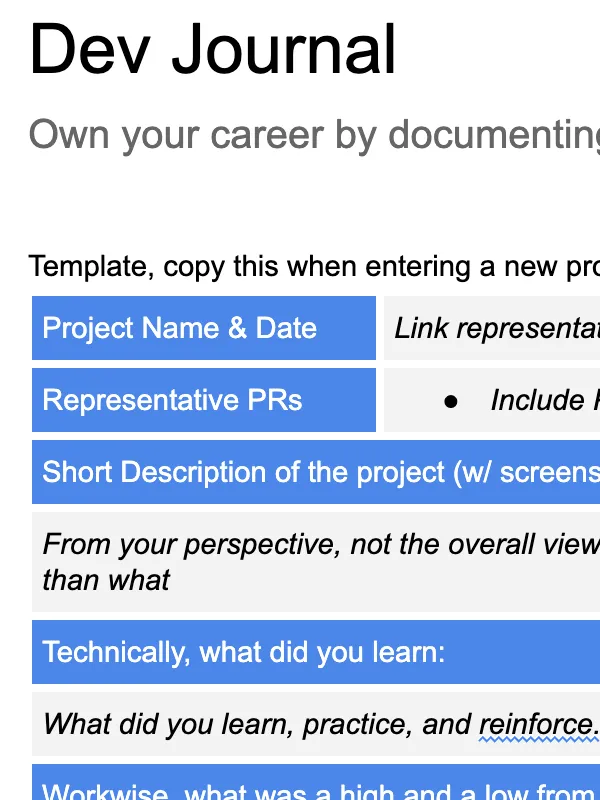Dev Journal

Updated: January 2024
When I was managing a large team, giving each person’s review the detail that it needed was a feat of strength. There are lots of other reasons that can make giving every end of year review the appropriate time and focus. Managing is a lot. To help with this, devs are often told to “Own Your Career”. It’s not quite victim-blaming, but it’s close. The idea is true: for important things, don’t depend too much on your manager. But often there’s no structure or instruction on what actually needs to be done.
As a fan of journaling, my tactic to empower a developer involves creating a structured journal for them to fill out over the year. An entry at the end of a project (roughly every 3-4 weeks) made a big difference at the end of the year. And it really made a difference when preparing promo and end-of-year review packets.
How to use this tool
Start the process with a 1:1 meeting in which discusses this very concept of “Owning Your Career”, mentioning how well-intentioned managers or late-year re-organizations inadvertently let developers down. The developers end up being insufficiently represented when it matters most. If reviews are every 6 or 12 months, missing out on an opportunity can impact them for years. It’s not fun news, but there is a way to avoid the risk. The rough structure of the 1:1 typically includes:
Raise the floor
This process helps them avoid being unintentionally punished by all manner of common workplace issues. If you’ve got a new or overwhelmed manager, giving them the data they need to help you out will make them better at doing just that.
Raise the ceiling
By adding documented, consistent, and regular personal retrospectives to their year, the developer will be more aware of their strengths, shortcomings, and how they fit into an organization. Putting in time to collect the “proof of work” (tickets, commits, etc) also gives some insight into how those systems support and hinder our progress. The knowledge gained by this “reflect and collect” process is something that’ll allow them to avoid future mistakes as well as improve the effectiveness of their time spent working. It can be the difference between getting promoted in this cycle vs. the next one
How you are going to support them
Being an accountability buddy is the key — you’re not here to do this work for them. However, if they don’t pick this up on their own, you should facilitate some initially to help them make it happen. This might mean doing a “manager typist” 1:1 where they talk through things and you type into the journal. It’ll give them a feel for what the journal can do and a sense of appropriate answers to the prompts.
When the journal works, share that it’s working! It could be with how well you can share their growth, how well they’re growing, how you’re able to support them and find meaningful opportunities.
This is the template that’ll get you started: